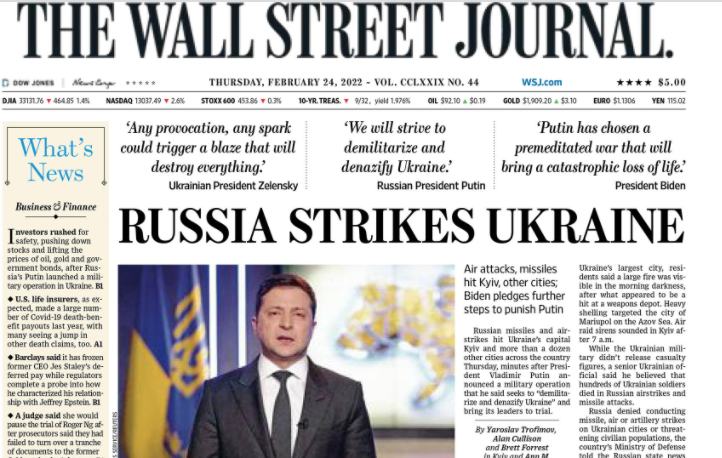
The Wall Street Journal has experienced a jump in subscriptions as readers attempt to understand the war in Ukraine.
Robert Thomson, chief executive of WSJ-owner News Corp, said there is a “huge appetite for understanding during a period of real tragedy”.
Speaking at a Morgan Stanley investor conference on Thursday, Thomson said the Journal has not experienced a “Trump slump” and suggested that rivals have suffered because readers perceive them as politically “biased”.
Click here to subscribe to Press Gazette’s must-read newsletters, Future of Media and Future of Media US |
On Ukraine, Thomson said: “You’re seeing a massive level of interest in the coverage. People are looking for factual [coverage] – what’s going on? It’s very confusing, fear of war. And, with that, comes the need to try and have some kind of understanding of the ebb and flow of, frankly, the violence. The brutality and the tragedy.”
In a recent email to staff, reported on by Press Gazette last week, Wall Street Journal editor-in-chief Matt Murray said: “Virtually every team in the newsroom has been touched by the story and has contributed to it,” he said. “Hundreds of you have been directly engaged in reporting, editing, producing, presenting and sharing our journalism.”
The Wall Street Journal’s “non-subscriber traffic is up 51%,” Thomson said. And “the number of subs is running at around 39% over outlook… that’s new subs. And that just [shows] that there is huge appetite for understanding during a period of real tragedy, particularly for the people of Ukraine.”
News Corp’s subscription forecasts, which vary day-to-day and week-to-week, are not public so it is unclear how much the Journal’s subscriptions business has grown in real terms. It will report figures when News Corp releases its next quarterly earnings later in the year.
David Clinch, head of global partnerships at Mather Economics, a specialist in subscription management and customer data analytics, said that other titles appear to be experiencing similar lifts in reader and subscriber interest.
He told Press Gazette: “The team at Mather has seen significant spikes in engagement for most news publishers related to their coverage of the Russian invasion of Ukraine.
“The publishers who appear to have seen an increase in subscriptions during this period include those who offer a combination of compelling on-the-ground reporting from Ukraine and in-depth coverage of the unprecedented global economic and geopolitical impact of the conflict.”
Later in his Morgan Stanley interview, Thomson talked about the Journal’s continued success and resilience in subscriptions. He suggested that rivals have suffered since Donald Trump left the White House.
“People talk about a Trump bump,” he said. “I think what we’ve seen at the Wall Street Journal is a trust bump – that people are looking for news that they trust. And so we haven’t had a post-Trump slump that has afflicted certain other media properties.”
“People are craving accuracy,” he added. “Opinion pages are opinion pages, and they’re absolutely entitled to have strong opinions. They have the objective of being subjective, and so they should.
“But readers want a journalism that has the objective of being objective. And they can tell on other platforms – I won’t name the guilty parties – they can tell that a lot of the news is fed through a political paradigm. There’s a political prism through which narratives are created.
“And I’ve always thought that a theme should come from the facts. A theme should not be generated by selectively choosing facts to support a theme, which is the content cart before the horse.
“Readers are smart. They can tell the difference. They can see when this newspaper or that newspaper is biased. They understand why they’re being biased, they don’t like it. And so affinity and loyalty to truth is an advantage to the Wall Street Journal.”
Email pged@pressgazette.co.uk to point out mistakes, provide story tips or send in a letter for publication on our "Letters Page" blog
